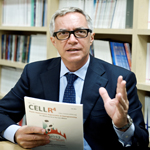High-Resolution Characterization of Human Ductal Progenitor Cells and their Regeneration Potential
Contact PI: Juan Dominguez-Bendala, PhD, University of Miami (U01 DK120393)
Ricardo Pastori, PhD, Investigator, University of Miami
Alejandro Caicedo, PhD, co-Investigator, University of Miami
Camillo Ricordi, MD, co-Investigator, University of Miami
Start Date: September 25, 2018
End Date: June 30, 2022
Abstract
The existence of progenitor cells in the non-endocrine compartments of the adult human pancreas (ductal/acinar) has been hypothesized for decades, but their characterization has proven elusive. We hypothesized that BMP-7 (a TGF-b ligand with dual TGF-b inhibition/BMP activation abilities) would induce the proliferation of putative resident pancreatic progenitors. Indeed, exposure of human non-endocrine tissue (hNEPT) to BMP-7 led to the formation and growth of colonies that, upon BMP-7 withdrawal, differentiated into multiple pancreatic tissues. In vitro lineage tracing showed that BMP-7-responsive cells in hNEPT express pancreatic duodenal homeobox (PDX1) and the BMP receptor 1A (also known as activin-like kinase-3, ALK3). However, they were negative for insulin and other mature pancreatic markers, including carbonic anhydrase II (CAII, previosuly considered a panductal marker). These cells can be sorted using ALK3 (bright fraction) and the purinergic receptor P2Y1 (P2RY1), a surrogate surface marker for PDX1+ cells. Sorted P2RY1+/ALK3bright+ cells can be cultured in defined conditions. They respond to BMP-7 by expanding as PDX1+/NKX6.1+ progenitor-like colonies, and differentiate into multiple pancreatic cell types (including b-like cells) upon BMP-7 withdrawal. qRT-PCR and RNAseq further confirmed the BMP-7-induced transcriptional activation of Inhibition of Differentiation (ID) proteins associated with progenitor cell proliferation, as well as the upregulation of markers of all adult pancreatic lineages following BMP-7 withdrawal. We have further identified the anatomic location of PDX1+/ALK3bright+ cells in the human pancreas within the major pancreatic ducts and pancreatic duct glands.
Our goal is to dissect the role and biology of these cells in the context of pancreatic tissue plasticity/regeneration, both in health and type 1 diabetes (T1D). Based on our data, we hypothesize that only specific subsets of ductal cells respond to ALK3 agonism by proliferating and, upon interruption of this stimulation, differentiating along multiple adult endocrine and exocrine pancreatic lineages. To test this hypothesis and its multiple ramifications, we will pursue the following specific aims: (1) High-resolution characterization of pancreatic ductal sub-populations obtained from healthy and T1D donors by single-cell RNAseq as well as mass spectrometry-based label-free proteomics. In this context, we will also characterize other potentially supportive cells in the progenitor cell niche, including those at the ductal stroma that may have roles in proliferation/migration/differentiation of epithelial progenitors. (2) Dynamic imaging and characterization of regeneration phenomena using virally-transduced reporter systems in live human pancreatic slice cultures. (3) Characterization and quantification of progenitor cells in healthy controls and T1D samples representative of various stages of the disease. (4) Determination of the in vivo regeneration ability of sorted human P2RY1/ALK3bright cells upon transplantation into immunodeficient rodents.
Our work will shed new light on the nature and capabilities of pancreatic progenitor cells, and may suggest potential interventions to induce b-cell regeneration in situ. These studies are aligned with several themes of this RFA and, if successful, will pave the way to the preclinical characterization of BMPR agonists as therapeutic leads.
Meet the Grant Team
Leadership |
 |
 |
 |
 |
||
Juan Dominguez-Bendala, PhDInvestigator |
|
Ricardo Pastori, PhDInvestigator |
Alejandro Caicedo, PhDCo-Investigator |
Camillo Ricordi, MDCo-Investigator |
|
Research Staff |
 |
|||||
Fahd QadirUniversity of Miami |
Publications
- Pancreatic β-cell regeneration in situ by the ALK3 agonist THR-123
- Bend It Like Occam: Ductal Origin of New Islet Cells in Human Pancreas After Injury
- SliceChip: a benchtop fluidic platform for organotypic culture and serial assessment of human and rodent pancreatic slices
- Dynamic scRNA-seq of live human pancreatic slices reveals functional endocrine cell neogenesis through an intermediate ducto-acinar stage
- Emerging Diabetes Therapies: Bringing back the β-cells
- Temporal single-cell regeneration studies: the greatest thing since sliced pancreas?
- Long-term culture of human pancreatic slices as a model to study real-time islet regeneration
- Single-cell resolution analysis of the human pancreatic ductal progenitor cell niche
- The Role of MicroRNAs in Diabetes-Related Oxidative Stress
- Pancreatic Progenitors: There and Back Again

